News & Events
Reflections on Africa’s futures
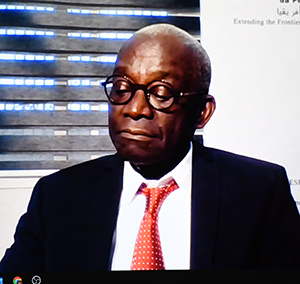
Prof Mamadou Diouf (Director of Institute for African Studies & Western African history professor at Columbia University)
Delivering the 2021 Unisa Founders Lecture, Professor Mamadou Diouf acknowledged that feminist theory and scholarly work have been overlooked in the African revolution. 'Women were not taken into account despite the role they played in independence, gender and generation,' he said.
Titled Explorations in 'Reclaiming Africa's futures': The Sources of African Humanities, the Founder's Lecture took place on 7 December at the Maslow Hotel, Times Square, in Menlyn, and was presented virtually by Professor Diouf from CODESRIA’s premises in Dakar, Senegal, due to Covid-19 travel restrictions.
Diouf engaged on the generation and gender-inequality of African literature. Among five female African books he listed, Diouf highlighted the community reconstruction and patriarchal order in Tsitsi Dangarembga's Nervous Conditions and Chimamanda Ngozi Adichie’s Purple Hibiscus.
Extensively published, Diouf discussed the necessity of producing new stories and inventions in Africa about African identities, histories, and literature. Globally, Diouf is one of the leading African scholars in the humanities specialising in major historical, social, political, and African issues. At the beginning of his presentation, Diouf confessed that the invitation to give the Founders Lecture was both an honour and a challenge.
He further explained: ‘I accepted the invitation because South Africa is the right place to engage with reflections on Africans and black humanity. It is one of the few countries in Africa and in the Global South where debates on the humanity in the area of globalisation have been rigorous. The area is defined by emphasis on science, technology, engineering, and mathematics. On the digital platform, the focus is on nature, religion, literature and humanities.’
Diouf’s lecture dealt with imagination, focusing on how Africa is imagined by both Africans and non-Africans. Diouf said his interest lies in tracing the challenges of intellectual writers, and activists of Africa in the African diaspora to confront the multiple intervention of Africa, Africans, and black people as objects of knowledge and resources of exploitation.
Reflecting on social urgency of humanities, Diouf mentioned the importance of advocating African solidarity and mentioned how the rhetoric of fiction can translate into reality by moving people back into the history and forward into the future. By assessing contributions of African scholars, Diouf stated that Africa’s knowledge has always been oppressed. He referenced Dr William Edward Burghardt Du Bois's work drawing from the revolution and epistemic history invented by African Americans.
Diouf stated that building African libraries and languages should be prioritised. He mentioned the political exposure of values and affairs, and the importance of the past and everyday African life to write history in art. “This is one of the rawest trajectories that will allow us to think out of the box,” he said.
Music in humanity
In her welcoming remarks, Professor Puleng LenkaBula, Principal and Vice-Chancellor (VC) of Unisa, said: 'We need to look no further than music as we saw during the Covid-19 pandemic that hope was reignited by young South Africans through the Jerusalema song and dance challenge.'
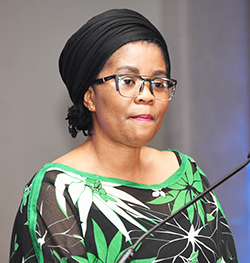
Prof Puleng LenkaBula (Unisa VC)
‘Shaping Africa,’ said the VC, ‘requires contemporary debates around humanities, especially in the time of Industry 4.0.’ She also mentioned authentication and validation of African knowledge systems. ‘Because of the oppressive systems that make us uncomfortable, we don't have to sell our knowledge systems,’ she said.
Professor Zodwa Motsa, Executive Director of Department of Leadership and Transformation, Professor Monde Ntwasa, Deputy Dean in the College of Agriculture and Environmental Sciences, and Dr Fundiswa Kobo, Senior Lecturer, Department of Christian Spirituality, Church History and Missiology responded to Diouf's presentation. In a discussion facilitated by College of Human Sciences Executive Dean, Professor Kgomotso Masemola, the three respondents presented a riveting and provocative stance on 'reclaiming Africa's futures'.
'You cannot talk about any discipline without humanity,' said Motsa. ‘I believe that humanities are the roadmap to the future. African music, art and hair braids are not just for fun, but for reclaiming identities.’
She further criticised Diouf’s presentation, saying that it focused on women only at a later stage. ‘It is an irony that modernity seems to bring glory to men only. It is the role of women to disseminate knowledge,’ she said. ‘We shall not be a footnote.’
Ntwasa ventilated key challenges around the theme and stated that the critical one is African history. He mentioned that much as colonisation involves subjugation of the mind, humanities play as a component of Africa’s Intellectuals.
He questioned the erasure of African history and its contributors. ‘Why did this erasure from African history occur, who are they, would they allow Africans to reclaim their futures?’, he asked. ‘An appetite to build Africa must be restored. We need to redress. Writing must lead to something. If we fail, we will allow history to repeat itself. People who practise humanities should act to redress, not just write.’
Kobo began by saying: ‘It is my assertion that any writings that are produced in humanities today cannot do justice if they continue to underestimate patriarchal violence. This has been one of the shortcomings even in the discourses that advocate for liberation and the restoration of black urgency in humanities.’
In addition, she stated that the fragmenting of a black woman in her own African heritage poses critical questions about the comprehensive liberation of black Africans as a whole, and that the fragmenting of black women cannot be separated from the fragmented nature of the ethos of empire.
‘The continuation of the imperial spirit inaugurated by a civilisation that has marked black bodies since 1492 has left black women reduced to fragments,’ she said. ‘The struggle to liberate the African heritage of the interconnectedness of life is itself now at risk of crumbling. To romanticize African worldview, heritage and blackness, which has so many times presented contradictions on the comprehensive liberation and black urgency of its people, would be a misnomer.’
Speaking as a black woman theologian, she mentioned that there are tendencies to speak of the black community as if black women don't exist. ‘This,’ she said, ‘has been a challenge that made it difficult to differentiate black theology from white theology, which it debunks as a theology that failed to take into account the existence of black people.’
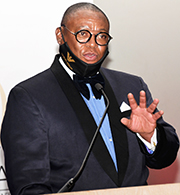
Prof Kgomotso Masemola (ED: CHS)
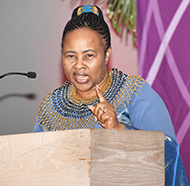
Prof Zodwa Motsa (ED: Leadership & Transformation Department)
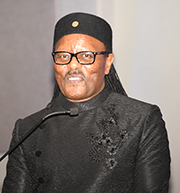
Prof Monde Ntwasa (DD: CAES)
In 2003, the Founders Lecture was established with the goal of encouraging the university and its stakeholders to talk about critical issues in higher education at both the national and global levels. Over the years, the lectures were presented by eminent and renowned scholars from across the continent and the globe on various topics. This is a premium platform for intellectual engagement of the highest order, and Professor Diouf gave a riveting address, reflecting on the future of Africans.
*By Lesego Chiloane-Ravhudzulo, Journalist, Department of Institutional Advancement
Publish date: 2021-12-08 00:00:00.0

